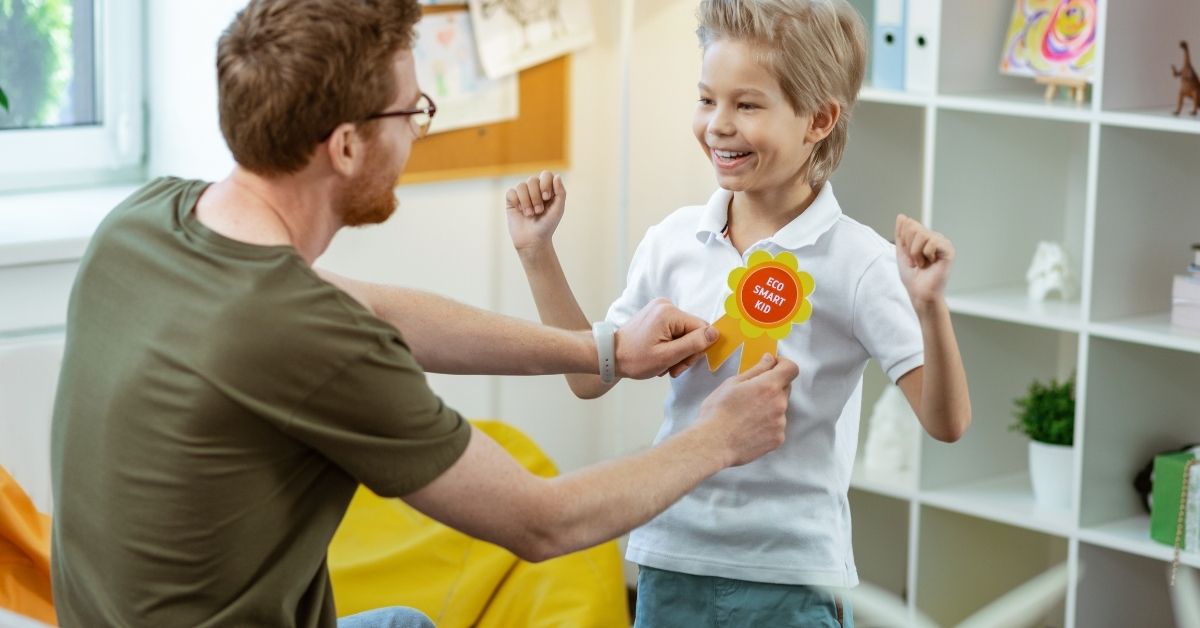Rewards are often used to motivate kids, but research shows they might not be as good as we think. Experts like Alfie Kohn and Richard, who worked on Self-Determination Theory in the 1970s and 1980s1, say rewards can harm kids’ motivation. They can also make kids feel anxious, ashamed, and controlled2.
Rewards can hide real behavior and treat symptoms, not the root cause. They can make kids feel less independent and lower their self-esteem2. Instead, experts suggest building strong relationships, giving kids freedom, and creating positive spaces. This helps kids develop their own motivation.
Key Takeaways
- Rewards can have unintended consequences, including decreased intrinsic motivation and increased anxiety.
- Experts recommend focusing on building relationships, autonomy, and positive environments to foster intrinsic motivation.
- Rewards can mask authentic behavior and create dependence on external validation.
- Tangible rewards without clear communication may not positively impact motivation1.
- Rewards linked to well-defined, challenging levels of mastery can enhance self-efficacy and intrinsic motivation1.
Understanding the Psychology Behind Reward Systems
Reward systems start with behavioral psychology. Self-Determination Theory by Richard Ryan and Edward Deci explains why we do things. It talks about intrinsic and extrinsic motivation3.
The Evolution of Reward-Based Behavior
Intrinsic motivation is doing things because they’re fun. Extrinsic motivation uses rewards to get us to act3. But, giving rewards for things we already like can make us like them less3.
Yet, rewards for doing well can make us feel more confident and interested3.
How Rewards Affect Brain Chemistry
Reinforcers are things that make us respond without learning first4. They can be good, making us want more, or bad, making us want less4. Both kinds of reinforcers change how we remember things4.
The Role of Motivation in Human Behavior
Feeling good or bad is linked to what happens to us4. Learning from these feelings is called action-outcome learning4. Rewards and punishments can change how we remember things4.
It’s important to understand how rewards work. Knowing about intrinsic and extrinsic motivation helps make better reward systems. These systems help us change our behavior for the better.
The Historical Development of Reward Systems in Education

Reward systems in education have changed a lot over time. Traditional methods5 used things like grades and stickers to motivate students. But, experts like Alfie Kohn have questioned their lasting impact5.
Too much focus on rewards can harm a student’s natural drive to learn. It can slow down skill development and increase mistakes5. Rewards might also take away from the real goal of education: helping students grow and learn5.
Today, education is moving towards encouraging students to learn for themselves. This is through ideas like autonomy, mastery, and purpose6. Research shows that when students are motivated from within, they do better and feel happier5.
The debate on using rewards in schools is ongoing. Teachers and researchers are looking at both sides of the argument5. They aim to find a balance that helps students succeed6.
The history of rewards in education shows a shift from external to internal motivation. This change is based on new findings in educational psychology and classroom management5. Teachers are working to create environments that foster a genuine love for learning65.
Rewards and Their Impact on Modern Parenting
Rewards are common in parenting, but their effects are complex. Research shows rewards can boost short-term behavior but harm long-term motivation and parent-child bonds7.
Short-term vs. Long-term Effects
Rewards quickly get kids to comply7. But, they can make kids focus too much on the reward, not the task itself7. The more rewards, the less kids want to do things for themselves7. This can make them less interested in learning and more focused on doing well7.
Cultural Differences in Reward Systems
Parenting styles, including rewards, differ across cultures. Western cultures often use rewards to motivate, while Eastern cultures value group harmony and inner drive7. Knowing these differences helps parents understand rewards’ impact better7.
Impact on Parent-Child Relationships
Dependence on rewards can make parent-child relationships transactional, not trusting7. Experts say building strong relationships and encouraging kids’ inner drive is better than rewards and punishments7.
Understanding rewards’ effects helps parents make better choices. They can create a supportive environment for parenting, child discipline, and cultural parenting styles7.
“The more rewards you use, the more an individual focuses on the reward rather than the task itself. This can undermine intrinsic motivation and lead to a decline in long-term performance.”
Parents must consider rewards’ short and long-term effects in positive parenting, child discipline, and cultural parenting styles. They should aim for an environment that boosts intrinsic motivation and strengthens parent-child bonds7.
The Connection Between Rewards and Intrinsic Motivation

The link between rewards and intrinsic motivation is complex. Self-Determination Theory says intrinsic motivation comes from feeling free, competent, and connected8. But rewards can sometimes mess with these feelings, making people focus more on getting something than enjoying the activity itself8.
Studies show rewards’ effect on motivation varies9. If rewards praise someone’s skill or progress, they can boost motivation9. But if they feel controlling or like a goal, they can hurt a person’s freedom and drive8.
It’s important to use rewards wisely. They should add to, not take away from, a child’s sense of control and skill8. By supporting self-motivation, parents and teachers can help kids love learning and strive to do their best on their own terms8.
| Intrinsic Motivation | Extrinsic Motivation |
|---|---|
| Driven by internal factors, such as personal values and interests10 | Driven by external rewards or incentives, such as money or praise10 |
| Leads to greater creativity and engagement8 | Can diminish intrinsic motivation over time10 |
| Fosters a sense of autonomy, competence, and purpose8 | Creates a competitive environment focused on external outcomes10 |
Knowing how rewards affect motivation helps parents and teachers create a supportive environment. This environment encourages curiosity, self-motivation, and a sense of autonomy and competence8. This approach is key for healthy growth and a lifelong love of learning8.
How Rewards Affect Children’s Emotional Development
Rewards can greatly affect a child’s emotional growth11. They can make a child feel their worth depends on what others think11. This can cause anxiety and stress if they don’t get rewards11. Children might also start to rely too much on rewards to feel good11.
Impact on Self-esteem
Studies show that focusing on how they do things, not just what they do, helps11. Giving praise and positive feedback is key in shaping their self-worth12. Praising specific actions is better than general praise for boosting self-esteem12.
Anxiety and Stress Responses
Rewards motivate kids to act well by being a reward for good behavior.12 But, too much focus on rewards can make kids anxious if they don’t get praise11. Staying calm and focusing on the effort, not just the outcome, can help13.
Emotional Dependency Patterns
Rewards can make kids too dependent on others for feeling good about themselves11. This can stop them from wanting to do things on their own13. Parents should give lots of praise and encouragement that fits the child’s actions and interests12.
Knowing how rewards affect kids helps parents create a better environment. This environment supports self-esteem, resilience, and emotional health111213.
| Positive Reinforcement Strategies | Benefits for Emotional Development |
|---|---|
| Descriptive Praise | Fosters self-esteem and positive self-image12 |
| Rewards Tailored to Child’s Interests | Enhances motivation and engagement12 |
| Focusing on Effort and Process | Reduces anxiety and stress responses11 |
| Unconditional Positive Regard | Supports healthy emotional development11 |
“Positive reinforcement is classified as the only type of discipline that works, according to Ira Chasnoff, M.D.”13
Understanding the link between rewards and kids’ emotional growth helps parents. They can build an environment that supports self-worth, resilience, and emotional health111213.
The Hidden Costs of Reward-Based Parenting
Reward systems might seem like a good way to motivate kids, but they have hidden downsides. Rewards can actually decrease intrinsic motivation, reduce creativity, and shift the focus from long-term learning to short-term gains.14 They can also make kids less likely to help others without being paid, which can hurt their social skills.
Positive discipline is a better way to teach kids. It focuses on teaching and solving problems, not just rewarding or punishing. This method helps kids learn to control themselves and find their own reasons to do things right, leading to lasting changes15. Alfie Kohn, a parenting expert, says moving away from rewards and punishments can help kids grow better in the long run.
“Rewards are not the answer. In fact, they’re part of the problem. They may get short-term compliance, but they undermine long-term motivation.”
– Alfie Kohn, author and parenting expert
Parents looking for better ways to motivate their kids should think about the downsides of rewards. By focusing on what kids want to do for themselves and using positive discipline, they can raise kids who are more well-rounded, resilient, and self-directed.
Rewards and Academic Performance
Rewards can have a big impact on how well students do in school. They might make students work harder and do better for a little while. But, they can also mess up how well students learn in the long run and how creative they can be in school16.
Some research says that rewards like points or the ‘House’ system can help students learn better over time16. But, using rewards too much can make students lose their love for learning on their own17.
Rewards can also affect how well students think creatively and solve problems. Students who get rewards for good grades might choose easier work to get more rewards. This can stop them from growing and learning how to think critically16. It’s important to make learning fun and engaging, not just about getting rewards17.
Teachers and parents should look for other ways to motivate students. By celebrating students’ achievements in many areas, not just grades, rewards can help students grow in all ways16. This way, students can feel good about themselves and explore their interests without just focusing on grades17.
The Impact of Rewards on Social Development
Rewards can greatly affect children’s social development. They might encourage good behavior in the short run. But, they can also hurt real empathy and kindness18. Kids who get rewards for sharing might share less on their own18.
Rewards can also make kids compete with each other. This can damage their friendships18.
To help kids grow socially, we should focus on why they’re kind and cooperative. It’s important to show them these values ourselves. Empathy and good social skills are vital for strong peer relationships19. By valuing kindness itself, we help kids feel the need to help others19.
“Rewards may undermine the intrinsic motivation that fosters true altruism and cooperation in children.”
The impact of rewards on kids’ social growth is complex. While they might improve some behaviors, they can harm kids’ social skills and peer relationships in the long run19. By focusing on what’s inside kids, not just rewards, we support their empathy and kindness19.
Alternative Approaches to Motivation and Encouragement
Traditional rewards might not always be the best way to motivate kids. Autonomy-supportive parenting focuses on giving choices and explaining why. This approach helps kids feel more independent and self-assured20.
Building Intrinsic Motivation
Teaching kids to have a growth mindset is key. It helps them see challenges as chances to learn and grow. This mindset boosts their love for learning and confidence20.
Strength-based methods also work well. They focus on what kids are naturally good at. When kids feel their strengths are valued, they dive deeper into their interests20.
Positive Reinforcement Techniques
Positive reinforcement can be very helpful. It rewards effort and progress without taking away from kids’ inner drive. This way, kids feel seen and valued without needing external rewards20.
| Motivation Approach | Key Benefits |
|---|---|
| Autonomy-supportive Parenting | Fosters independence and self-determination20 |
| Growth Mindset | Encourages a love of learning and self-efficacy20 |
| Strength-based Approaches | Promote engagement and motivation by nurturing natural talents20 |
| Positive Reinforcement | Acknowledges effort and progress without undermining intrinsic motivation20 |
Using these alternative methods, parents can help kids find their true purpose. This empowers them to reach their highest potential20.
Understanding Neurodivergent Children and Reward Systems
Children with ADHD or on the autism spectrum might not react the same to rewards as others. Research shows that rewards can work for autistic, making it important for parents to find rewards that each child likes21. Also, autistic people might find it hard to get motivated by social rewards, showing we need more study in this area21.
For kids with ADHD, rewards can help if used right to improve their planning skills. Dopamine helps us seek good things, and autistic brains might see rewards differently21. But, we should not rely too much on rewards, as it might make kids expect them all the time and lose their natural drive. Yet, studies say rewards can be okay if used right, without hurting motivation21.
Autistic kids like using visual aids, like charts, to show good behavior.21 Making a good reward system for autistic kids means picking rewards they like, setting clear goals, and showing them the long-term benefits. Using their special interests to motivate them is also key22.
| Reward System Strategies for Neurodivergent Children |
|---|
|
“Many therapists supporting Autistic kids often use rewards, reinforcers, and frequent praise as motivators for engaging in learning activities.”23
Rewards can be good for neurodivergent kids, but we should not rely too much on them. We can encourage them by showing them how to do things step by step and by mixing up activities they like and don’t like23. It’s important to tailor our approach to each child’s needs and likes to help them stay motivated and succeed in the long run.
The Role of Praise versus Tangible Rewards
Research has shown that praise can be more effective than material rewards in some cases. Studies indicate that verbal rewards can be better than material ones in certain situations24. It’s important to know the different types of praise and when it might be harmful.
Different Types of Praise
Not all praise is the same. Process praise, which focuses on effort and strategies, is better than person praise. Person praise can make children believe their abilities are fixed25. Process praise helps children see they can improve with hard work25.
When Praise Becomes Harmful
Praise can be powerful but can also backfire if used too much or wrongly25. Too much praise can make children rely on it too much and lose their motivation25. Some praise, like person praise, can hurt a child’s self-esteem and make them afraid to fail25.
To be effective, praise should be specific, sincere, and focus on what the child can control24. If praise becomes expected or fake, it can harm a child’s self-esteem and growth mindset25.
| Effective Praise | Ineffective Praise |
|---|---|
|
|
The role of praise in child development is complex. Research shows praise can help with a child’s growth mindset, self-esteem development, and effective praise. But, it’s crucial to know the different types of praise and when it can harm to ensure children do well emotionally and academically.
“Praise functions differently from tangible rewards and does not have a detrimental effect on intrinsic motivation for prosocial behavior among young children.”25
By understanding praise’s nuances and using it wisely, parents and educators can create a supportive learning environment. This environment nurtures a child’s growth mindset language and supports their self-esteem development.
Creating Sustainable Motivation Without Rewards
Sustainable motivation comes from creating autonomy-supportive environments and setting meaningful goals. It also involves fostering self-directed learning. By giving choices and explaining tasks, parents and teachers help kids feel in control26.
Setting goals that match personal values boosts intrinsic motivation. Kids are more likely to enjoy activities that are meaningful to them27.
Encouraging self-reflection helps kids set their own standards for success. This way, they don’t need external rewards to feel good about themselves27. By focusing on the joy of learning, we can build lasting motivation that doesn’t rely on rewards27.
Supporting kids’ curiosity and love for learning is key. Letting them take charge of their education builds a sense of ownership27. This approach helps kids become self-motivated learners, ready for success in all areas of life.
FAQ
What are the potential unintended consequences of using rewards to motivate children?
How do rewards relate to intrinsic and extrinsic motivation?
How have reward systems evolved in educational settings?
How do cultural differences influence the use and perception of rewards?
How can rewards affect children’s emotional development?
What are the hidden costs of reward-based parenting?
How do rewards impact academic performance and learning outcomes?
How can rewards influence children’s social development?
What are some alternative approaches to building intrinsic motivation in children?
How do reward systems impact neurodivergent children differently?
What are the differences between praise and tangible rewards, and how can they be used effectively?
How can parents and educators create sustainable motivation without relying on rewards?
Source Links
- Separating Fact from Fiction: The Impact of Rewards on Children’s Intrinsic Motivation — Child and Teen Solutions
- The Risks of Rewards – Alfie Kohn
- The Science Behind Incentives and Rewards in Shaping Positive Team Behaviors
- Reward: What Is It? How Can It Be Inferred from Behavior? – Neurobiology of Sensation and Reward
- The Effect of Rewards and Motivation on Student Achievement
- The Dark Side of rewards and punishments in the classroom part I : My College
- Does Rewarding Children Backfire?
- Intrinsic Motivation: How Internal Rewards Drive Behavior
- Pervasive negative effects of rewards on intrinsic motivation: The myth continues
- Differences Between Intrinsic and Extrinsic Rewards
- Giving Kids Rewards for Good Behavior Will Not Ruin Them
- Praise, encouragement and rewards
- Rewards Don’t Work – Here’s What Does
- Six Reasons Rewards Don’t Work
- Financial Incentives for Promoting Participation in a School-Based Parenting Program in Low-Income Communities
- Effects Of Rewards On Students | Foundation Education
- Impacting Student Success Through Renaissance Rewards and Relationships
- Development of Monetary and Social Reward Processes – Scientific Reports
- Tips for Using Rewards
- Employee Motivation : 20 Easy Ways to Motivate Your Coworkers & Employees
- Autism Reward System: All You Need to Know
- Rewarding Your Child Who Has Autism, Reward System For Autistic Child — Autism Specialty Group
- Rethinking Reinforcers for Autism – Learn Play Thrive
- The effects of praise: Evidence-based tips for better outcomes
- *CorpusGood_Chapter
- How to Motivate People Toward Sustainability – Network for Business Sustainability (NBS)
- Rethinking Motivation — Why Extrinsic Rewards Might Not Be the Answer





